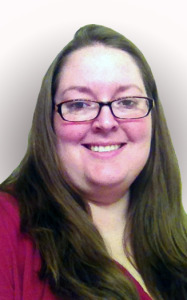Spotlight on Provider: Jamie Booth
We have many talented and dedicated staff at KVC Kentucky. In Spotlight on Providers, we’ll introduce you to some of our best providers. This month we chat with Jamie Booth, CSW, MSW, who is a Family Preservation Specialist in the Bluegrass Fayette Region.
What are your responsibilities as a Family Preservation Specialist?
I work with families who have been referred to KVC by the Department for Community Based Services (DCBS). It’s my job to guide the families through their case plan so the children can remain safely in the home. Sometimes the children are at risk of being removed from their homes or I help reunify families after the children have been out of the homes for some time.
What are some of the benefits of KVC’s in-home services?
Seeing families in their home environment provides me with a lot of information on how they function. People act differently if they’re out in public or visiting a therapist in an office, but being in the homes gives an accurate representation of why I’m needed. It also allows my clients to practice the skills I teach them where they will actually be used.
How does KVC work with clients differently than other agencies?
All clients referred to our Family Preservation Program (FPP) are usually working with multiple agencies at once. They have an open DCBS case, work with mental health providers, schools, and more. Many of my clients are often overwhelmed by all the appointments and people instructing them. Family Preservation is based on the Homebuilders Model and part of that model is collaborating with families- working with them side by side. My clients participate in setting their own goals and how they want to accomplish them. I help them, rather than tell them what to do.
Why did you decide to become a clinician?
I took a long road to get here. I knew I wanted to help people, but wasn’t sure what form that would take. In college, I had to fulfill a credit requirement and somehow ended up in an introduction to social services class. After attending the class, I realized this is what I wanted to do with my life. I attended the class unintentionally, but I intentionally became a social worker.
How long have you been at KVC?
For a little over three years. I first started in the IMPACT Plus program (now Behavioral Health Services) as a case manager, but when KVC was awarded the FPP and Diversion contracts I switched over to my current program in July 2012.
What do you enjoy about being a FPP specialist?
I get to do intensive, hands on work with my clients. FPP’s intensity allows me to make quick progress with my families, which is a very rewarding.
What are some of the successes and challenges you’ve had as a service provider?
Many families are pretty skeptical on my first visit, because they don’t know who I am or what I’m there to do. Sometimes it’s difficult to build rapport, but as I work with my clients they come to understand I’m there to help. Many are even sad that services are ending. Once you get over the initial barriers, things go quite well.
Another challenge I’ve seen is working in the rural counties. Unlike Lexington, which has a lot of available resources, the counties are extremely limited. You have to be creative to solve a problem, when there isn’t an obvious solution.
I consider all my clients who continue to make positive gains after services end as successes. I do follow up visits periodically and many of them are doing much better than how they were.
Does a particular success come to mind?
I had a family that was newly homeless, a child with discipline issues, and the parents had separated, but just as services started they got back together. Working with them required me to find them housing, making a plan about how the parents would work things out, and teaching the parents new ways to discipline the child. What impressed me from the beginning was that they were invested in the services. At the end, the family had stable housing, the mother had a job, and the child was responding well to the discipline.
